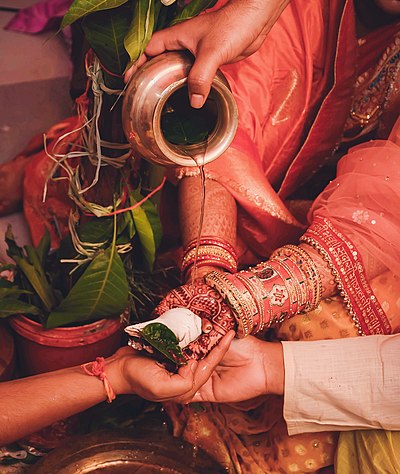
Search
Kanyadana

Kanyadana (Sanskrit: कन्यादान, romanized: Kanyādāna) is a Hindu wedding ritual. One possible origin of this tradition can be traced to 15th century stone inscriptions found in the Vijayanagara Empire in South India. There are different interpretations regarding kanyadana across South Asia.
Etymology
Kanyadana is made of the Sanskrit words kanyā (maiden) and dāna (giving away), referring to the tradition of a father giving his daughter in marriage to a groom. symbolizing the transfer of responsibility and care from one family to another.
Kanyadana songs
In communities where kanyadana is performed as part of the actual wedding, the ritual is carried out through a variety of kanyadana songs. These songs may include the parents lamenting the loss of their daughter etc. Other songs focus on the groom, for example comparing him to the "ideal groom", the god Rama, in the epic Ramayana. Importantly, the kanyadana ritual occurs right before the sindoor ritual (sinduradana).
See also
- Vivaha
- Marriage in Hinduism
References
Further reading
- Gutschow, Niels; Michaels, Axel; Bau, Christian (2008). The Girl's Hindu Marriage to the Bel Fruit: Ihi and The Girl's Buddhist Marriage to the Bel Fruit: Ihi in Growing up - Hindu and Buddhist Initiation Ritual among Newar Children in Bhaktapur, Nepal. Otto Harrassowitz Verlag, Germany. ISBN 3-447-05752-1. pp. 93–173.
Text submitted to CC-BY-SA license. Source: Kanyadana by Wikipedia (Historical)
Articles connexes
- Hindu wedding
- Odia Hindu wedding
- Vijayanagara Empire
- Kanyaadaana
- Sitalsasthi
- Samskara (rite of passage)
- Meenakshi Tirukalyanam
- Chitpavan Brahmins
- Musuri Krishnamurthy
- Balaraj
- List of Odia films of 2023
- Marathi people
- Harini (Kannada actress)
- T. N. Balakrishna
- Uttam Mohanty
- Hunsur Krishnamurthy
- Daivadnya
- Odisha State Film Awards
- List of Kannada films of the 1950s
Owlapps.net - since 2012 - Les chouettes applications du hibou



